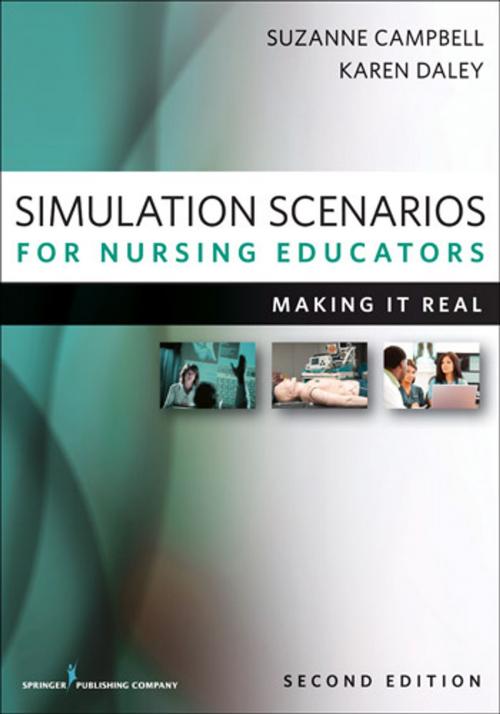Simulation Scenarios for Nursing Educators, Second Edition
Making It Real
Nonfiction, Health & Well Being, Medical, Nursing, Assessment & Diagnosis, Medical & Surgical, Fundamentals & Skills| Author: | Suzanne Campbell, PhD, RN, WHNP-BC, IBCLC, Karen Daley, PhD, RN | ISBN: | 9780826193278 |
| Publisher: | Springer Publishing Company | Publication: | December 14, 2012 |
| Imprint: | Springer Publishing Company | Language: | English |
| Author: | Suzanne Campbell, PhD, RN, WHNP-BC, IBCLC, Karen Daley, PhD, RN |
| ISBN: | 9780826193278 |
| Publisher: | Springer Publishing Company |
| Publication: | December 14, 2012 |
| Imprint: | Springer Publishing Company |
| Language: | English |
Awarded second place in the 2013 AJN Book of the Year Awards in the Information Technology/Informatics category
ìThe passion, caring, and inspiration of the authors are reflected and demonstrated in each and every chapterÖCompiling all of the authorsí lessons learned, teaching-learning strategies, and in-depth research and exploration of their topics, this book is an excellent guide for nursing faculty just getting started with simulations or is validation for faculty who are already using this pedagogy.î
From the Foreword by Pamela R. Jeffries, PhD, RN, FAAN, ANEF
Professor, Associate Dean for Academic Affairs
Johns Hopkins University School of Nursing
This second edition of an acclaimed book for nurse educators provides a practical, step-by-step guide to designing and developing simulation scenarios and integrating them into the nursing curriculum. Based on extensive discussion with contributing authors and new faculty, the text has been updated to include changes in simulation pedagogy since the first edition was published in 2008, and thoroughly reorganized to facilitate greater ease-of-use. Outstanding features include scenarios easily adaptable to the instructorís own lab, and a new section on graduate nursing education and interdisciplinary clinical scenarios. Scenarios are ordered according to their complexity for ease of access.
The authors provide concrete information about the use of simulation in a variety of programs, courses, and schools, and describe how nursing faculty have mastered the challenge of integrating simulation into their curricula, from fundamental nursing arenas to more complex levels of care. Chapters discuss how simulation can be used with such diverse populations as medical-surgical, geriatric, pediatric, trauma, obstetric, and home care. The book offers scenario-running instructions, as well as recommendations on developing faculty, integrating point-of-care decision-making tools and necessary equipment, how to set up a lab (including static to high-fidelity manikins), and much more. Scenarios explore key themes in nursing, from ethics, spirituality and palliative care, to communication and cultural diversity. A template for creating scenarios spans the text and includes student preparation materials, forms, and checklists.
This updated edition includes:
- Scenarios easily adaptable to an instructorís own lab
- A new section on graduate nursing education and interdisciplinary clinical scenarios
- New interdisciplinary, interprofessional, and community-based scenarios
- Expansive chapter templates
- Focus on cultural sensitivity, health literacy, and research methods
- Information on certification issues and integrating e-records in simulation
Awarded second place in the 2013 AJN Book of the Year Awards in the Information Technology/Informatics category
ìThe passion, caring, and inspiration of the authors are reflected and demonstrated in each and every chapterÖCompiling all of the authorsí lessons learned, teaching-learning strategies, and in-depth research and exploration of their topics, this book is an excellent guide for nursing faculty just getting started with simulations or is validation for faculty who are already using this pedagogy.î
From the Foreword by Pamela R. Jeffries, PhD, RN, FAAN, ANEF
Professor, Associate Dean for Academic Affairs
Johns Hopkins University School of Nursing
This second edition of an acclaimed book for nurse educators provides a practical, step-by-step guide to designing and developing simulation scenarios and integrating them into the nursing curriculum. Based on extensive discussion with contributing authors and new faculty, the text has been updated to include changes in simulation pedagogy since the first edition was published in 2008, and thoroughly reorganized to facilitate greater ease-of-use. Outstanding features include scenarios easily adaptable to the instructorís own lab, and a new section on graduate nursing education and interdisciplinary clinical scenarios. Scenarios are ordered according to their complexity for ease of access.
The authors provide concrete information about the use of simulation in a variety of programs, courses, and schools, and describe how nursing faculty have mastered the challenge of integrating simulation into their curricula, from fundamental nursing arenas to more complex levels of care. Chapters discuss how simulation can be used with such diverse populations as medical-surgical, geriatric, pediatric, trauma, obstetric, and home care. The book offers scenario-running instructions, as well as recommendations on developing faculty, integrating point-of-care decision-making tools and necessary equipment, how to set up a lab (including static to high-fidelity manikins), and much more. Scenarios explore key themes in nursing, from ethics, spirituality and palliative care, to communication and cultural diversity. A template for creating scenarios spans the text and includes student preparation materials, forms, and checklists.
This updated edition includes:
- Scenarios easily adaptable to an instructorís own lab
- A new section on graduate nursing education and interdisciplinary clinical scenarios
- New interdisciplinary, interprofessional, and community-based scenarios
- Expansive chapter templates
- Focus on cultural sensitivity, health literacy, and research methods
- Information on certification issues and integrating e-records in simulation















